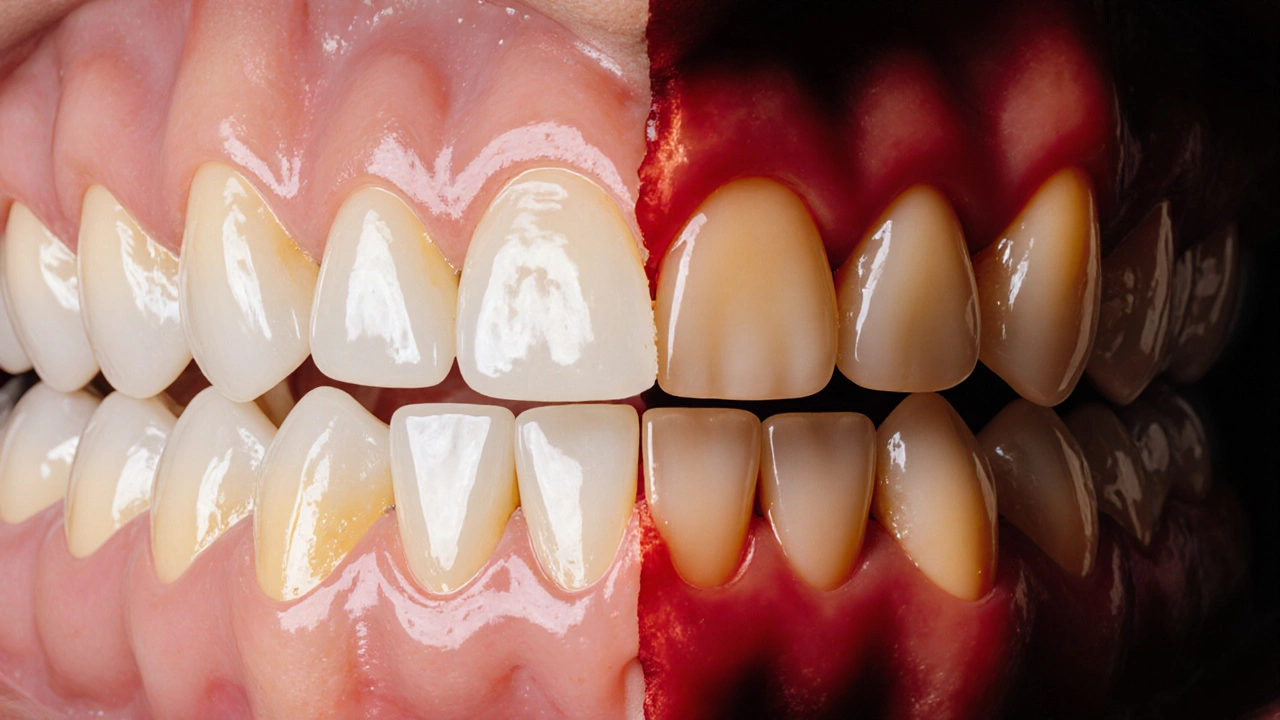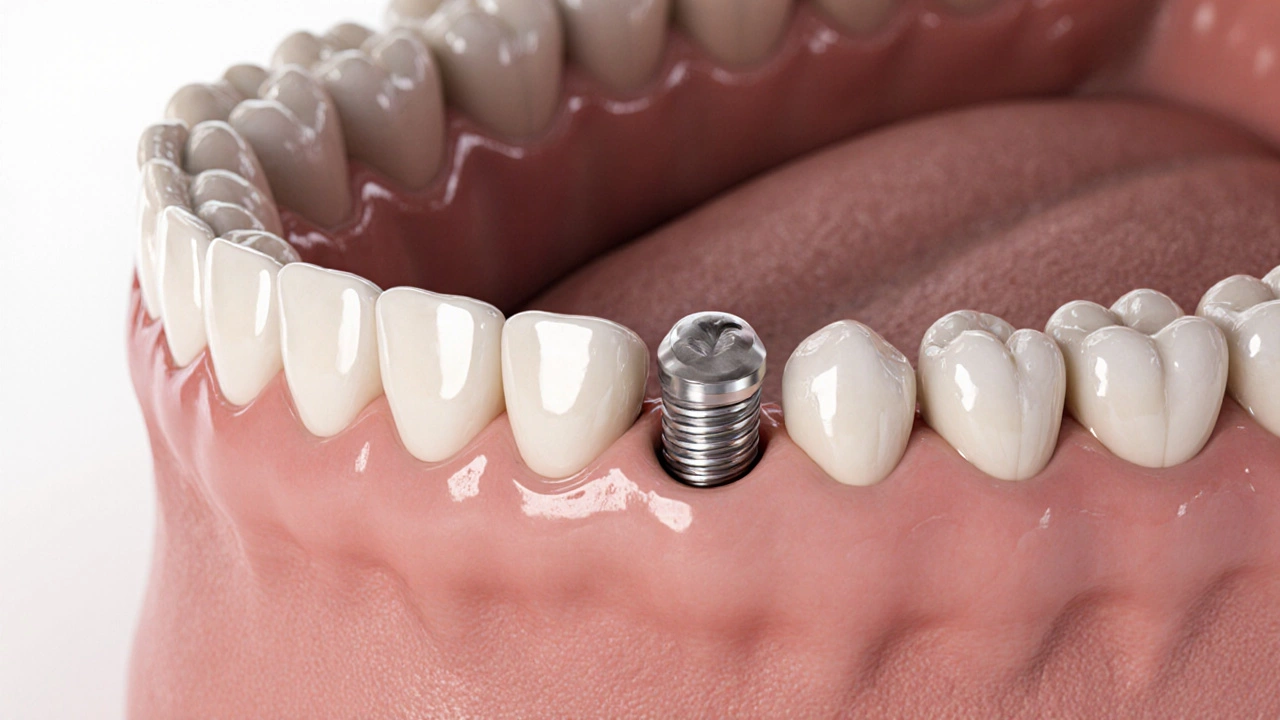Dental Implant Longevity Calculator
How Long Will Your Implants Last?
Based on your habits and health conditions. The average implant lasts 20-30 years with proper care.
Your Lifestyle Factors
Smokers have up to 3x higher failure rates due to reduced blood flow and slower healing.
Poorly controlled diabetes (HbA1c > 8%) increases failure risk significantly.
Teeth grinding puts excessive pressure on implants and can cause crown damage.
Daily flossing, interdental cleaning, and professional cleanings are crucial.
Adequate bone density is critical for implant stability and long-term success.
When you think about getting a dental implant, the big question isn’t just how much it costs-it’s how long it’ll last. You’re not just buying a replacement tooth. You’re investing in your ability to eat, speak, and smile without worry for decades. So how long do dental implants actually last? The short answer: most last 20 to 30 years, and many last a lifetime-if they’re placed right and taken care of.
What Makes Dental Implants Last So Long?
Dental implants aren’t like dentures or bridges that sit on top of your gums. They’re titanium screws fused directly into your jawbone. That fusion, called osseointegration, is what gives them their strength. Once the bone grows around the implant, it becomes a permanent part of your mouth. This is why implants don’t slip, shift, or need adhesives like dentures do.
The implant itself-the titanium post-isn’t what usually fails. It’s one of the most biocompatible metals used in medicine. In fact, titanium implants have been used since the 1960s, and many of the first ones are still working today. The real risks come from what happens around the implant: gum disease, poor oral hygiene, or excessive pressure from grinding.
Success Rates and Real Data
According to long-term studies published in the Journal of Clinical Periodontology, dental implants have a success rate of over 95% after 10 years. At 20 years, that number drops to about 90%. That means for every 100 implants placed, 90 are still functioning two decades later.
Why the drop? Not because the implant broke. It’s usually because the gum tissue and bone around it started to recede due to peri-implantitis-a condition similar to gum disease. It’s preventable, but it’s the #1 reason implants fail after the first decade.
What Shortens the Lifespan of Dental Implants?
Not all implants last as long as they should. Here’s what actually causes them to fail:
- Smoking: Smokers are up to 3 times more likely to lose an implant. Nicotine reduces blood flow to the gums, slowing healing and making infections more likely.
- Diabetes: Poorly controlled blood sugar weakens the immune system and delays healing. Diabetics with HbA1c above 8% have significantly higher implant failure rates.
- Teeth grinding (bruxism): If you clench or grind your teeth, the force can crack the crown or overload the implant. Night guards are often recommended.
- Poor oral hygiene: Brushing twice a day isn’t enough. Flossing around implants and using interdental brushes is critical. Plaque buildup leads to inflammation, then bone loss.
- Low bone density: If your jawbone is thin or weak, the implant may not integrate properly. Bone grafts can help, but they add complexity.
How to Make Your Implant Last a Lifetime
There’s no magic trick. Long-lasting implants come down to three things: quality placement, consistent care, and smart habits.
- Choose an experienced dentist: Implant success is 70% dependent on how it’s placed. Look for a dentist who does 50+ implants a year and has CBCT imaging (3D scans) to plan the surgery.
- Brush and clean daily: Use a soft-bristle toothbrush and a non-abrasive toothpaste. Clean between the implant and gum with a water flosser or interdental brush at least once a day.
- Visit your hygienist every 3-6 months: Regular cleanings are non-negotiable. Hygienists use special tools to clean implants without scratching the surface. Most insurance plans cover this.
- Stop smoking: If you smoke, quitting is the single best thing you can do for your implant’s longevity.
- Wear a night guard if you grind: Even if you don’t feel like you grind, your dentist can spot signs of wear on your teeth or implant crown.

What Happens When an Implant Fails?
If an implant does fail, it’s not the end of the road. The failed implant can be removed, the area cleaned, and sometimes a new one placed after the bone heals. In some cases, bone grafting is needed first. The success rate for replacing a failed implant is still over 85%.
But here’s the thing: replacing an implant is more expensive and takes longer than preventing failure in the first place. That’s why maintenance matters more than the initial cost.
Implant Components: What Needs Replacing?
It’s important to know that the implant screw itself rarely needs replacement. But the crown-the visible tooth part-might need to be replaced every 10-15 years due to wear, chipping, or changes in your bite.
Some people think their implant is failing when it’s just the crown wearing out. That’s a simple fix: your dentist removes the old crown and places a new one. It’s like changing the tire on your car, not replacing the engine.
Abutments (the connector between implant and crown) are also durable but can loosen over time. If your crown feels wobbly, don’t ignore it. A loose abutment can lead to infection if not fixed quickly.
Age and Implants: Are They Only for Young People?
No. There’s no upper age limit for dental implants. Patients in their 70s and 80s have them placed all the time. In fact, older adults often benefit the most-they regain the ability to eat nutritious foods like apples, nuts, and steak, which improves overall health.
The only age-related concern is bone density. As we age, bone can thin. But modern techniques like mini-implants or zygomatic implants (anchored in the cheekbone) can help even those with very little jawbone.

Cost vs. Long-Term Value
An implant might cost $3,000 to $5,000 per tooth. That sounds steep compared to a $500 bridge or $1,500 denture. But here’s the math:
- A bridge lasts 7-10 years. You’ll likely need 2-3 replacements in your lifetime.
- Dentures need relining every 2-3 years and replacement every 5-8 years.
- An implant, if cared for, lasts 20-30+ years. That’s one cost, one procedure, one solution.
When you factor in time, comfort, and fewer dental visits, implants are often the most cost-effective choice over your lifetime.
What About Cheap Implants from Overseas?
Some people travel abroad for lower-cost implants. While it can save money upfront, the risks are real. Many countries don’t require the same standards for implant materials or surgical training. Studies show implants placed in low-regulation clinics have 2-3 times higher failure rates.
Also, if something goes wrong years later, you can’t easily go back to a clinic across the world. Your local dentist might not even be able to fix it. Stick with a trusted provider who stands behind their work.
Final Thoughts: It’s Not Just About the Implant
Your dental implant’s lifespan isn’t determined by the brand or the price tag. It’s determined by you. Brushing after meals, avoiding tobacco, showing up for cleanings, and speaking up when something feels off-that’s what turns a 20-year implant into a lifetime one.
Most people who lose their implants didn’t lose them because the implant was bad. They lost them because they stopped taking care of their mouth.
Do dental implants last forever?
Dental implants can last a lifetime, but not automatically. The titanium post often lasts decades without issue, but the crown may need replacement every 10-15 years. Long-term success depends on oral hygiene, regular dental visits, and avoiding habits like smoking or teeth grinding.
Can dental implants get cavities?
No, implants themselves can’t get cavities because they’re made of titanium and ceramic. But the gums around them can get infected, leading to peri-implantitis, which can cause bone loss and implant failure. That’s why cleaning around implants is just as important as cleaning natural teeth.
How do I know if my implant is failing?
Signs of failure include pain, swelling, bleeding gums, looseness of the crown, or a bad taste in your mouth. You might also notice gum recession around the implant. If you feel any of these, see your dentist right away. Early treatment can often save the implant.
Is there a difference between cheap and expensive implants?
Yes. Higher-quality implants use medical-grade titanium with proven surface treatments that improve bone integration. Cheaper implants may use lower-grade materials or lack long-term clinical data. Brand matters-companies like Nobel Biocare, Straumann, and Zimmer Biomet have decades of research backing their products.
Can I get implants if I have gum disease?
You can, but not until the gum disease is under control. Active infection around natural teeth or bone can spread to the implant site and cause failure. Your dentist will treat the gum disease first-through deep cleaning, antibiotics, or surgery-before placing the implant.
Do I need to replace my implant after 10 years?
No, you don’t need to replace the implant itself after 10 years. The crown or abutment might need replacing due to wear or damage, but the titanium post is designed to last. If your implant feels solid and your gums are healthy, it’s likely still working perfectly.
Are dental implants worth the cost?
Yes, for most people. While the upfront cost is higher than bridges or dentures, implants last longer, require fewer replacements, and preserve jawbone health. They also let you eat and speak naturally without worry. Over 15-20 years, they often cost less than other options that need repeated repairs or replacements.
